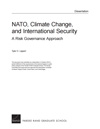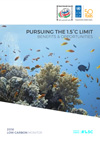-
Adapting NATO to Climate Change, and the Economic Benefits of the 1.5-Degree Limit
January 13, 2017 By Sreya Panuganti In his dissertation, Tyler H. Lippert of the Pardee RAND Graduate School explains how the transboundary security impacts of climate change will both challenge and elevate the role of international multilateral institutions like the North Atlantic Treaty Organization (NATO). Lippert argues that while there are groups within NATO working on climate-related issues at the state level, such as the Emerging Security Challenges Division, the organization’s decision-making processes are largely reactive and require the consensus of all 28 member states. This decentralization makes little use of the strength of NATO’s member states, which individually have strong planning capabilities, and could prevent NATO from quickly responding to nonlinear, complex problems. Lippert suggests analysis via a risk management framework, such as that developed by the non-profit International Risk Governance Council, could help NATO adapt and better coordinate its efforts with individual member states and other international organizations.
In his dissertation, Tyler H. Lippert of the Pardee RAND Graduate School explains how the transboundary security impacts of climate change will both challenge and elevate the role of international multilateral institutions like the North Atlantic Treaty Organization (NATO). Lippert argues that while there are groups within NATO working on climate-related issues at the state level, such as the Emerging Security Challenges Division, the organization’s decision-making processes are largely reactive and require the consensus of all 28 member states. This decentralization makes little use of the strength of NATO’s member states, which individually have strong planning capabilities, and could prevent NATO from quickly responding to nonlinear, complex problems. Lippert suggests analysis via a risk management framework, such as that developed by the non-profit International Risk Governance Council, could help NATO adapt and better coordinate its efforts with individual member states and other international organizations. Allowing global temperatures to rise 1.5 degrees Celsius beyond pre-industrial averages could cost the global economy $12 trillion by 2050, or 10 percent of the entire global GDP over that period, according to a new report from the United Nations Development Program (UNDP) and the Climate Vulnerable Forum, a group of four dozen highly vulnerable countries. Countries party to the 2015 Paris Agreement agreed to limit the increase in global temperature to 2.0 degrees Celsius, while a 1.5-degree limit was put forward as an aspirational goal. The report illustrates the many benefits of actually adhering to the 1.5-degree limit versus the 2.0-degree limit, including preserving at least 10 percent more of the world’s coral reefs; reducing wheat yield losses by 10 to 15 percent in developing regions by 2050; and substantially lowering the risk of inundation to the world’s lowest-lying nations and territories. By taking advantage of cutting-edge renewable technologies, investing in the low-carbon sector, and facilitating the diffusion of renewables between developing countries, countries can achieve both the 1.5-degree goal, and help avoid devastating losses from the worst scenarios.
Allowing global temperatures to rise 1.5 degrees Celsius beyond pre-industrial averages could cost the global economy $12 trillion by 2050, or 10 percent of the entire global GDP over that period, according to a new report from the United Nations Development Program (UNDP) and the Climate Vulnerable Forum, a group of four dozen highly vulnerable countries. Countries party to the 2015 Paris Agreement agreed to limit the increase in global temperature to 2.0 degrees Celsius, while a 1.5-degree limit was put forward as an aspirational goal. The report illustrates the many benefits of actually adhering to the 1.5-degree limit versus the 2.0-degree limit, including preserving at least 10 percent more of the world’s coral reefs; reducing wheat yield losses by 10 to 15 percent in developing regions by 2050; and substantially lowering the risk of inundation to the world’s lowest-lying nations and territories. By taking advantage of cutting-edge renewable technologies, investing in the low-carbon sector, and facilitating the diffusion of renewables between developing countries, countries can achieve both the 1.5-degree goal, and help avoid devastating losses from the worst scenarios.Sources: Climate Vulnerable Forum, United Nations Development Program, RAND Corporation.
 A Publication of the Stimson Center.
A Publication of the Stimson Center.





